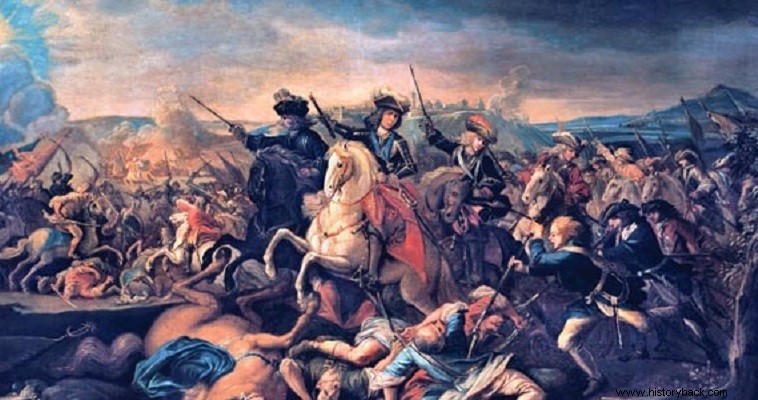
Eugene of Savoy was born in France. His father served in the French army and he sought to follow in his footsteps. However, Louis XIV of France did not accept him and he was forced to turn to the Austrians. His choice was reinforced by two events. Firstly his elder brother was already serving as an officer in the Austrian army and secondly, in the year 1683, the Turks were at the gates of Vienna.
In 1682 a new rebellion had broken out in the Austrian-occupied part of Hungary. Count Emery Tokoly had stirred up many of his countrymen against the Austrians. He did not even hesitate to ask for the help of the Turks, offering them the "protection" of Hungary.
The Turks, of course, did not miss the opportunity. Leaded by the grand vizier Kara Mustafa, a huge Ottoman army (200-250,000 men) invaded Austrian territory. Emperor Leopold was in for a surprise. Having focused his attention on dealing with the threat he heard in the name of Louis of France, he had left his eastern borders exposed.
The minimal forces he managed to muster against the Turks - 18,500 men - were naturally defeated by their tenfold opponents in the Battle of Petronel (July 5, 1683). Two days later Pressburg fell to the Ottomans. There was nothing between the barbarians and Vienna anymore. On July 17, the Ottoman army began the systematic siege of the city.
The Emperor Leopold had already abandoned the city, the defense of which he had entrusted to Count Starrenberg and 18,000 men. But at the same time, a series of diplomatic contacts began which resulted in the Austrian, Polish and German coalition against the Turks. On September 3, 78,000 men had gathered and were placed under the command of the Polish king John Sobieski. Their goal was only one, the lifting of the siege and the liberation of Vienna.
Young Eugene had joined as an officer in a dragoon regiment – the later 3rd Dragoon Regiment. On September 12, the Christian army had taken positions opposite the Turkish besiegers. Eugene's regiment was under the command of generals Caprara and Saxen, on the extreme left of the allied army. At 06.00 that day the Christian forces began their attack.
The Austrian forces were positioned on the extreme left of the allied line, facing the strongest wing of the Ottoman army. The Austrians slowly began to advance. The terrain was broken, hindering their rapid movement, while allowing the Bosnian snipers of the Turkish army to comfortably carry out their mission.
The Austrian dragoons undertook the task of clearing the Nussberg Hills. They dismounted and on foot engaged the Bosnians, eventually forcing them to retreat after a four-hour engagement. But then the Turkish cavalry intervened. With an impetuous advance he tried to overturn the Austrians and "throw" them behind the hills.
However, the dragoons, in cooperation with the infantry, crushed the Turks with their heavy fire. By 13.00 the Austrian vanguards, where Eugene was also fighting, had reached the village of Diebling, repelling the Turks and approaching the besieged Vienna. There the Austrians halted and waited for their Polish and German allies to align with them. This was achieved around 16.00. Then they all together repeated the attack.
The Austrian army, with the advance guard of the dragoon regiments, broke the Turkish right and, turning to the right, encircled the Turkish center. A general attack by the allied army followed which resulted in the complete defeat of the Turks. The flag of the "prophet", the holy relic of Islam, also fell into the hands of the victors. Europe was spared the fate of Byzantium. The young Eugene had particularly distinguished himself in the battle of Vienna, revealing for the first time his true inclination to military art.
